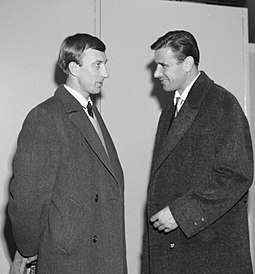Igor Netto
Igor Aleksandrovich Netto (Russian: Игорь Александрович Нетто; 9 January 1930 – 30 March 1999)[1] was a Soviet–Russian footballer, considered one of the greatest Soviet players ever. He started out playing on the left of defense but, due to his offensive mentality, dribbling and technical abilities turned into a dynamic central midfielder. His versatility and footballing intelligence allowed him to play a number of positions across defense and midfield.
 Igor Netto (left) and Lev Yashin in 1961 | |||||||||||||||||||
| Personal information | |||||||||||||||||||
|---|---|---|---|---|---|---|---|---|---|---|---|---|---|---|---|---|---|---|---|
| Full name | Igor Aleksandrovich Netto | ||||||||||||||||||
| Date of birth | 9 January 1930 | ||||||||||||||||||
| Place of birth | Moscow, Soviet Union | ||||||||||||||||||
| Date of death | 30 March 1999 (aged 69) | ||||||||||||||||||
| Place of death | Moscow, Russia | ||||||||||||||||||
| Playing position(s) | Midfielder | ||||||||||||||||||
| Senior career* | |||||||||||||||||||
| Years | Team | Apps | (Gls) | ||||||||||||||||
| 1949–1966 | FC Spartak Moscow | 368 | (36) | ||||||||||||||||
| National team | |||||||||||||||||||
| 1952–1965 | Soviet Union | 54 | (4) | ||||||||||||||||
| Teams managed | |||||||||||||||||||
| 1967 | AC Omonia | ||||||||||||||||||
| 1968 | FC Shinnik Yaroslavl | ||||||||||||||||||
| 1969–1970 | Iran (Assistant) | ||||||||||||||||||
| 1970–1971 | Iran | ||||||||||||||||||
| 1973–1975 | FC Spartak Moscow (Assistant) | ||||||||||||||||||
| 1975 | FC Spartak Moscow | ||||||||||||||||||
| 1976–1977 | Panionios | ||||||||||||||||||
| 1979 | Neftchi Baku | ||||||||||||||||||
Honours
| |||||||||||||||||||
| * Senior club appearances and goals counted for the domestic league only | |||||||||||||||||||
Ice hockey and club career
Besides football, Netto played 22 games in the 1948–49 and 1950–51 seasons as an ice hockey forward for Spartak.[2] He quit because of the high level of traumatize intrinsic to hockey.[3][4]
During his club career he played for FC Spartak Moscow from 1949 until 1966, scoring 37 goals in 367 league games, winning five Soviet championships and three cups.
International career

He was the captain of the USSR national football team from 1954 to 1963. He led the country to the gold medal in the 1956 Summer Olympics,[1] and victory at the first ever European Championship in 1960. He missed all but one match in the 1958 FIFA World Cup due to injury, and also played all four matches in the 1962 FIFA World Cup when the Soviet Union reached the quarterfinals. In total he collected 54 international caps and four goals.[5]
Netto was a person of exceptional honesty, which was revealed most remarkably during the 1962 FIFA World Cup match against Uruguay. At a 1–1 score, Igor Chislenko managed to strike through the net, and the resulting goal was mistakenly counted by the referee who has not seen the ball trajectory. Hearing protests from the Uruguayan keeper, Netto confirmed with Chislenko that the ball went through the net, and convinced the referee to discount the goal. Netto's team won that match anyway.[3][4]
Managerial career
After retiring in 1966 he had a long, though unsuccessful career as a coach, training AC Omonia, FC Shinnik Yaroslavl, Iran, Panionios and Neftchi Baku. Netto was awarded the Order of Lenin in 1957. The stadium of Spartak Moscow reserves team is named after him.[4]
Personal life
Netto was of Estonian and Italian descent. He was known as goose for his hissing voice, as well as goose-like walk and head shape. On 9 January 1960 he married Olga Yakovleva, an actress. They divorced around 1987 when Netto was suffering from Alzheimer's disease.[3][4]
Career statistics
International goals
| # | Date | Venue | Opponent | Score | Result | Competition | |||||
|---|---|---|---|---|---|---|---|---|---|---|---|
| 1. | 16 September 1955 | Dynamo Stadium, Moscow, Soviet Union | 11–1 | Win | Friendly | ||||||
| 2. | 2 December 1956 | Olympic Park Stadium, Melbourne, Australia | 4–0 | Win | 1956 Summer Olympics | ||||||
| 3. | 27 July 1957 | Dynamo Stadium, Moscow, Soviet Union | 2–1 | Win | 1958 World Cup qual. | ||||||
| 4. | 15 August 1957 | Olympic Stadium, Helsinki, Finland | 0–10 | Win | 1958 World Cup qual. | ||||||
| Correct as of 7 March 2016[6] | |||||||||||
Honours
- Spartak Moscow
- Soviet Champion (5): 1952, 1953, 1956, 1958, 1962
- Soviet Cup Winner (3): 1950, 1958, 1963
- Soviet Union
- UEFA European Football Championship (1): 1960
- Soviet Olympic team: 3 games in 1952 and 5 games in 1956, with 1 goal and gold medal in 1956.[1]
- National team: 54 caps, 4 goals; participant and quarter finalist in the 1958 and 1962 playing totally in 6 matches
- Individual
- UEFA European Championship Team of the Tournament (1): 1960
References
| Wikimedia Commons has media related to Igor Netto. |
- Igor Netto Archived 6 March 2014 at the Wayback Machine. sports-reference.com
- Нетто Игорь Александрович. spartak-history.ru
- Elena Grigorievskaya (9 January 2014) Рыжие волосы, Гусь и приключения на ипподроме. Самые интересные истории, связанные с Игорем Нетто. gazeta.ru
- Игорь НЕТТО. rusteam.permian.ru
- Igor Netto. national-football-teams.com
- "Igor Netto - national football team player". eu-football.info.